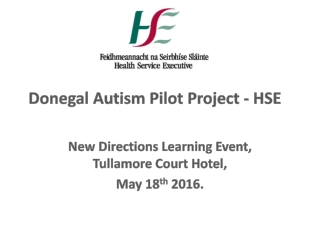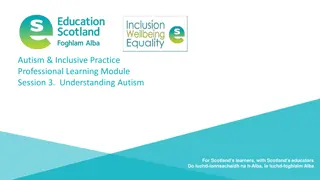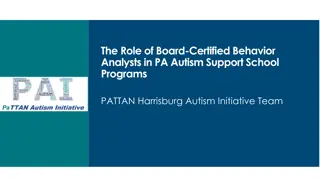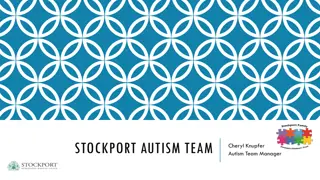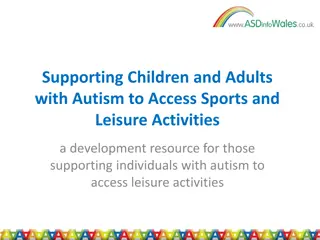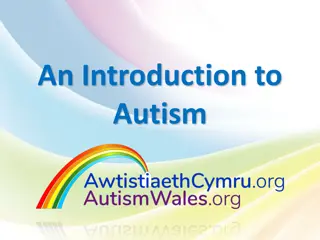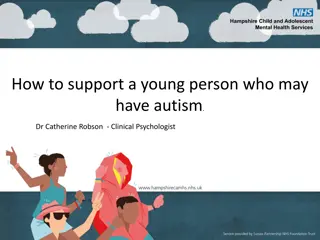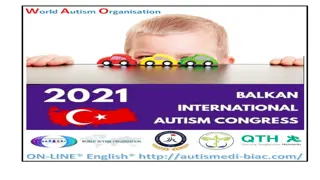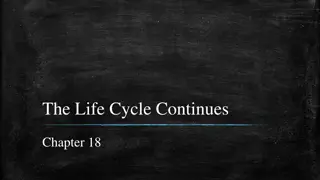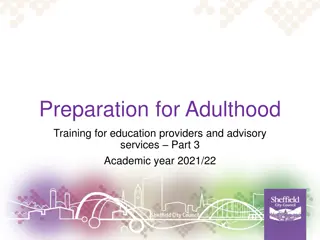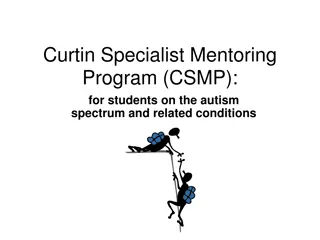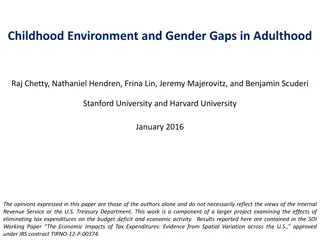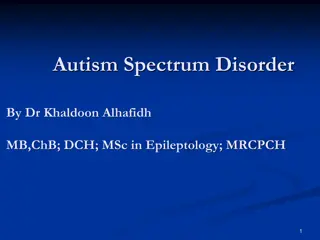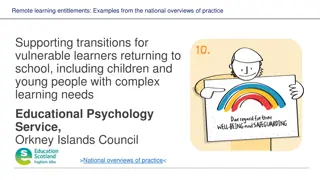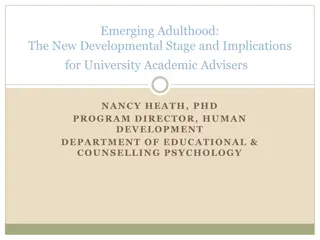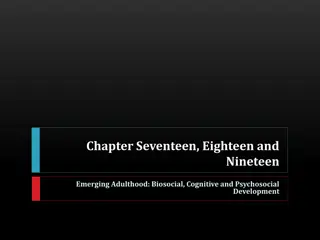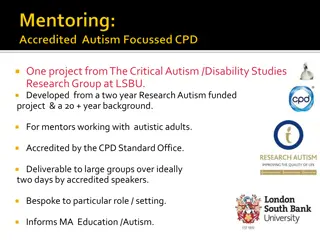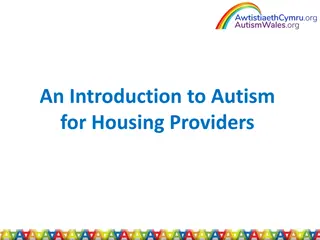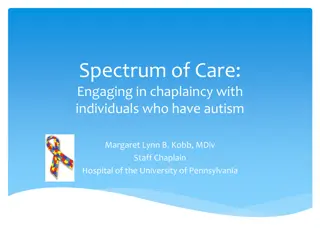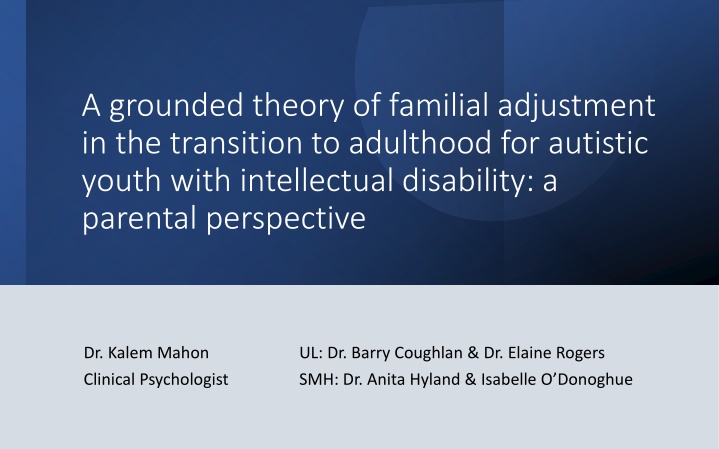
Grounded Theory of Familial Adjustment in Transition to Adulthood for Autistic Youth
Explore a grounded theory study on familial adjustment during the transition to adulthood for autistic youth with intellectual disabilities, focusing on parental perspectives. Investigate the impact of this transition on families and caregivers, with insights gathered from systematic reviews on parent support and caregiving roles in various countries.
Download Presentation

Please find below an Image/Link to download the presentation.
The content on the website is provided AS IS for your information and personal use only. It may not be sold, licensed, or shared on other websites without obtaining consent from the author. If you encounter any issues during the download, it is possible that the publisher has removed the file from their server.
You are allowed to download the files provided on this website for personal or commercial use, subject to the condition that they are used lawfully. All files are the property of their respective owners.
The content on the website is provided AS IS for your information and personal use only. It may not be sold, licensed, or shared on other websites without obtaining consent from the author.
E N D
Presentation Transcript
A grounded theory of familial adjustment in the transition to adulthood for autistic youth with intellectual disability: a parental perspective Dr. Kalem Mahon Clinical Psychologist UL: Dr. Barry Coughlan & Dr. Elaine Rogers SMH: Dr. Anita Hyland & Isabelle O Donoghue
A Note on Language Autistic person/youth is used in this presentation This is recommended by the The National Institute for Health and Care Excellence (NICE, 2016)
Why This Research? The transition to adulthood can be a significant time in the lives of autistic individuals and their families. Parents of autistic youth can experience elevated caregiving demands in the transition to adulthood (see Hendricks & Wehman, 2009). Caregivers can report high levels of stress and anxiety while securing systems of support for autistic youth (Newsome, 2008). There is limited research on the transition to adulthood in an Irish context.
Systematic Review: Parents Experience of Transition Research Questions: Parents support/caregiving roles Impact of transition on parents Search Strategy Population, Exposure, Outcome (PEO) Five databases (PsychInfo; CINAHL; Education Source; Medline; Academic Search Complete) Screening PRISMA (Moher et al., 2009) Quality: Critical Appraisal Skills Programme (CASP UK, 2013) Data synthesis: Thematic Synthesis (Thomas & Harding, 2009)
Systematic Review Findings Findings synthesised from 29 qualitative studies with at least 489 parent participants Studies were conducted across nine countries over an eight year period (2012-2020).
Systematic Review Parent Support/Caregiving Roles Holding responsibility for coordinating services and supports Supporting and developing their youth s independence Balancing the push for independence and need for support Tentatively encouraging and supporting youth s autonomy Teaching skills to support youth s independence Advocating for youth to ensure adequate support and equal opportunities Planning and preparing for youth s adult lives Planning for youth s transition Accessing and preparing youth for adult roles Preparing for their youth s long-term future Caregiving for youth beyond transition Providing practical support to youth in adulthood Providing social and emotional support to youth in adulthood 06.11.19
Systematic Review Impact on Parents Transition can lead to psychological and emotional challenges for parents Transition can impact on parent's life circumstances Transition can lead to changes in parent's relationships with their youth Parents adopt personal coping strategies and seek support from others to manage the impact of transition
The Present Study: A Grounded Theory of Familial Adjustment Research Question: What are parents experiences of, and perspectives on, the complexities of autistic youth transitioning to adulthood? Data collection: Semi-structured interviews 7 parents of autistic youth with an intellectual disability All parents agreeing to participate were from one organization Analysis: Constructivist Grounded Theory (Charmaz, 2014) Initial and Focused Coding Constant Comparison Memo Writing Theory Development
Findings: The Transition Context Service transition A move from school to adult day and/or residential services A shift from child clinical supports to adult clinical supports Developmental transition A change in expectations of youth as they become adults Legal changes 06.11.19
The Grounded Theory: Familial adjustment in the transition to adulthood
Preparing 1. Engaging with transition planning Instigating transition planning Timeliness of transition planning 4. Getting informed about legal changes in autonomy, consent and guardianship Uncertainty regarding parent s role in consent 5. Preparing youth for change Developing youth s readiness for change Teaching skills for adult life 2. Accessing funding and appropriate services Navigating funding processes Limited choice Services organizing practicalities of placements 3. Finding, accessing and navigating information about transition and services Getting information from peers, and professionals in schools and adult services No one place for accessing information
Adapting 4. Adapting to changing advocacy needs Advocating for service access 1. Adapting to adult service provision Some experiencing a gap between child and adult services Handover Parent-service collaboration 5. Adapting to changing expectations and opportunities Relationships Identifying work opportunities 2. Adapting to changing professional supporters Developing trust in staff 6. Adapting to ongoing and evolving parental caregiving demands A loss of roles Providing ongoing care 3. Adapting to changes in autonomy and consent Abrupt shift vs gradual approach to changes in autonomy Can be a challenge and a positive Consent and decision-making capacity
Forecasting 1. Forecasting youth s long-term care needs Managing youth s care as parents age 2. Identifying and preparing for future residential needs Concern over potential future residential move Planning in advance 3. Considering and preparing arrangements for youth s future guardianship, decision making and financial needs
Emotional Toll - Stressors 1. Personal Stressors Personal preferences for sameness impacted by uncertainty Personal health struggles 2. Familial Stressors Residential transition 3. Organisational Stressors Difficulties with planning Some experiencing a gap in service provision Ongoing changes to service provision Information 4. Societal Stressors Covid-19 inaccessibility of familiar places
Emotional Toll Resources & Support 1. Personal Resources Perseverance, resilience, seeing challenges as tasks to work through Work negotiations 2. Peer Support Connecting with peers for emotional support or practical information A desire for formal support groups 3. Family Support Offers and efforts to help 4. Professional Support Schools and adult services Online training and resources A desire for parent counselling
Potential Implications Theoretical model A start in mapping the area for the transition to adulthood for families of autistic youth Provides a starting framework for services and organisations Outlines stressors that can be targeted and relevant supports that can be fostered Areas to address from a clinical and policy perspective Transition planning timing and involvement Accessibility of adult services Changes to decision making expectations Future Research Further exploration of the theory s/model s utility across various regions and with differing populations Quantitative research to explore the factors contributing to adjustment Further exploration of decision-making changes in adulthood and/or assisted decision making as this is formalised in Ireland
References National Institute for Health and Care Excellence (NICE). (2016). https://www.nice.org.uk/corporate/ecd1 Hendricks, D. R., and Wehman, P. (2009). Transition From School to Adulthood for Youth With Autism Spectrum Disorders: Review and Recommendations. Focus on Autism and Other Developmental Disabilities. 10.1177/1088357608329827 Newsome, W. (2008). Parents perceptions during periods of transition: Implications for social workers serving families coping with autism. Journal of Family Social Work, 5(2), 17 31. doi:10.1300/J039v05n02_03 Critical Appraisal Skills Programme (2018). CASP Qualitative Checklist. [online] Available at: https://casp-uk.net/casp-tools-checklists/ Accessed: July 2021 Thomas, J., and Harden, A. (2008). Methods for the thematic synthesis of qualitative research in systematic reviews. BMC Medical Research Methodology, 8(45). https://doi.org/10.1186/1471-2288- 8-45 Moher, D., Liberati, A., Tetzlaff, J., Altman, D. G., (2009). Preferred Reporting Items for Systematic Reviews and Meta-Analyses: The PRISMA Statement. PLoS Med 6(7). Doi:10.1371/journal.pmed1000097 Charmaz, K. (2014). Constructing Grounded Theory (2nd Ed.). London, UK: SAGE Publications Ltd.

